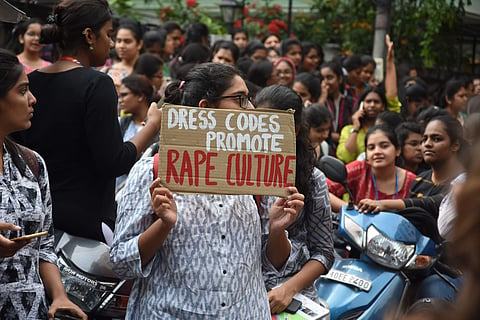

There is a storm on social media with videos being circulated on the objectionable ways in which students of a women’s college in Hyderabad are being treated over “appropriate dress” by the principal, in person, at the institute’s entrance. The move comes as a surprise, as until a year ago, the college was known to provide an enabling atmosphere for learning, collegiality and positive sociality. While there are little pockets of conservatism and restraint on questions of gender even in the most liberal institutions, what comes across in these videos is quite frankly shocking. While the students are expectedly in protest against this treatment, stars and celebrities have weighed in against the shocking demeanour of the administration.
St Francis Degree College for Women is one of the best colleges in the city with a long history of excellent teaching and student performance. I have had occasion to see its workings at close quarters and have been gratified by the freedom it allowed its students — whether in the matter of dress or in the matter of co-curricular activities. I was particularly struck by the amazing performance of a play on Partition at an annual day celebration to a packed audience of parents, families and teachers – and am certain that for many in the audience, it was their first exposure to a different, sensitive and complex narration of the Partition.
Authoritarian practices
In dress as well, except for the ‘no sleeveless top’ rule, the rest was easy, although I cannot fathom the logic behind a ‘no sleeveless’ rule either. But the trouble with rules of this kind are that they quickly, insidiously and aggressively proliferate and before you know it, the principal in person, and later a hired security staff in her place, ‘sorts’ young women at the gate of the college – “you go in, you stay out.” The provocation this time is not sleeveless, of course. It is that they are wearing kurtis, not kurtas, and their knees are ‘exposed’ inside their churidars/pants. Jeans and trousers with T-shirts and short tops are of course out of question.
The worrying part of this is the deeper questions its raises in terms of authoritarian practices in the administration of educational institutions, and the derogation of dignity it perpetuates. The college is known to have a competent and sensitive set of teachers who work wonders in the classroom. And yet, they are conspicuous by their absence in this fracas. The public treatment of students in this manner is an affront to their dignity and places undue restrictions on their speech and expression – while some may risk exposing this college action anonymously, when admissions, attendance and other matters related to enrolment are involved, fear of punitive action may well force students to comply.
Humiliating treatment
After going through this humiliating treatment at the entrance of the college, what is the kind of learning that is possible through the day? And learning, the college administration should know, is not limited to classroom teaching alone. What are the lessons being taught by the head of the institution on treatment of fellow beings with dignity and mutual respect? And on the lack of accountability of persons in authority over persons in their charge. Especially when you know you have absolute power, the challenge lies in the refusal to wield that power. In that the institution has failed.
The tragic part of this whole episode is that it is older women treating young women in this manner, falling straight into the misogynist stereotype of women being women’s enemies. At a time when movements for women’s rights have spent three decades or more, dismantling stereotypes of this kind and fought to restore basic freedoms for women under the most difficult and trying circumstances, this raw policing of women students by the college administration and the wilful creation of hostile environments is an unnecessary roll-back of hard-won struggles for democratisation of institutions of higher education in the country.
(The author is Director, Council for Social Development)